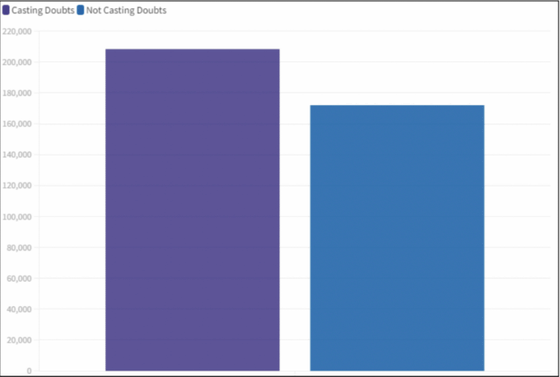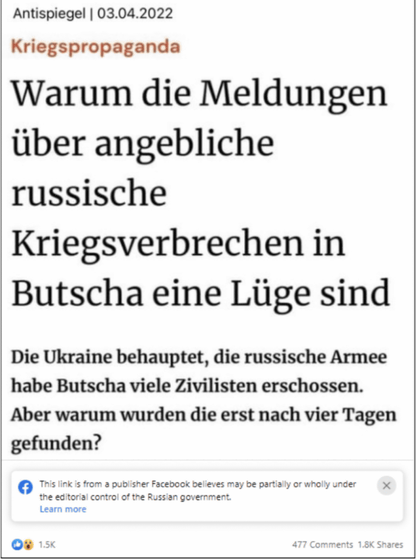It is clear that 'unknown information denying Russia's atrocities' is more popular on Facebook than the truth that is happening in Russia

Non-profit that promotes the protection of human rights and the crackdown on radicalism and disinformation when content that denies Russia's atrocities is more popular on Facebook than content that posts the truth that is happening in Russia as it is The group
On Facebook, Content Denying Russian Atrocities in Bucha is More Popular than the Truth --ISD
https://www.isdglobal.org/digital_dispatches/on-facebook-content-denying-russian-atrocities-in-bucha-is-more-popular-than-the-truth/
Since Russia's invasion of Ukraine, videos and photos of Russia's atrocities in Ukraine have been posted on the Internet. Russia has become more and more isolated from the international community as the international media reported extensively on the atrocities of Russian troops in Ukraine. We are disseminating 'disinformation that denies atrocities.'
Russia's fake news that 'Ukraine is lying' is exploding-GIGAZINE

ISD has been posted on Facebook in 20 countries around the world since Russia's invasion of Ukraine's Bucha on March 30, 2022, as to how such fake news by Russia actually affected. We conducted a survey to analyze the contents of Ukraine. The 20 countries surveyed were Austria, Cyprus, Czech Republic, France, Germany, Greece, Hungary, Ireland, Italy, the Netherlands, Poland, Portugal, Slovakia, Spain, the United Kingdom, Argentina, Brazil, Canada, and the United States. This is Venezuela.
ISD uses CrowdTangle , a social media monitoring platform, for research. We analyzed the word 'Bucha' in various languages posted on Facebook in the seven days from March 30th to April 6th, 2022 in 20 target countries. Only the top 10 most shared posts, including. In other words, only 200 posts from 20 countries were analyzed.
After that, ISD investigated whether the 200 posts analyzed were 'pro-Russian news by Russian media' or 'correct information reported by major Western media'. Even if no explicit prejudice is found by the Russian media, if the content of the report cannot be confirmed to be correct, it is classified as 'Pro-Russian News'.
After 200 posts analyzed, 44 were classified as 'Pro-Russian News', 6 of which were posted on pages associated with Russian state media or the Russian embassy. It has become clear. Also, six of the 44 posts were posted by the Russian state media, and three of the top 10 most shared posts in Venezuela were from the Russian state media. The following are the most shared posts in Venezuela that include 'Bucha'.

The breakdown of the countries where 44 posts were shared is as follows.

Fifty-five (27.5%) of the posts analyzed questioned the legitimacy of photographs taken in Bucha, reported by Western media. We also find that 55 posts that question the atrocities committed in Bucha are significantly more shared than posts that treat the atrocities in Bucha as facts. The 55 posts are shared 208,416 times in total, while the remaining 145 posts are shared only 170,063 times in total.

Most of the posts analyzed do not contain fact check labels, and only two posts contain labels that refer to the source. These two cases also belonged to publishers who believe Facebook is partially or wholly under the control of the Russian government.

The ISD said, 'We have witnessed various information warfare on Facebook as an aftermath of the genocide in Bucha. Fact checks, interviews with witnesses and survivors, and atrocities in the suburbs of Kieu. Despite the widespread coverage of local reports, the most shared posts on Facebook were only posts that questioned credibility, including bloggers, fake information pages, and alternative media from pro-Russia. It shows great success in amplifying information and shaping information warfare discourse on social media. '
Related Posts:
in Web Service, Posted by logu_ii






